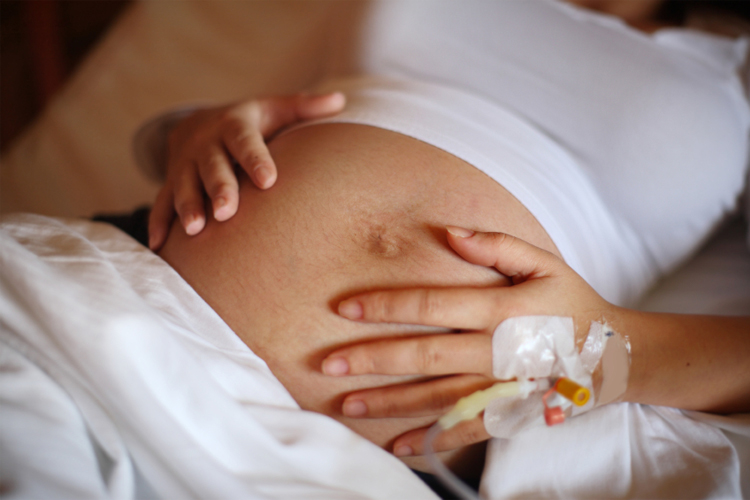In the final stages of Karisa Bugal’s pregnancy with her second child, she received a terrible diagnosis — and found herself faced with a harrowing decision.
As Aurora, Colorado’s 9 News reports, Bugal was already in labor when doctors discovered she had an extremely rare condition called amniotic fluid embolism. Dr. Kelly Gerow told 9 News last week, “The amniotic fluids surrounding the baby or part of the baby’s skin or hair gets into the mother’s bloodstream and that causes catastrophic shutdown of all the organs. We don’t know how to prevent it. We don’t know how to keep it from happening at all.” Gerow says that the condition is so unusual “it hasn’t been extensively studied” but that maternal death is not uncommon. Both mothers and children who do survive often face serious long-term health consequences.
Soon after her doctors explained the situation to Bugal, then they noticed the baby’s heart rate starting to dip. That’s when her family says she chose to have a caesarian with full anesthesia, knowing that, as Gerow says, “Her other option would have been to stay awake for her surgery, but by the time we would have put in a spinal tap or something. It’s possible Declan would not have made it.” But her son Declan did make it. Bugal, on the other hand, lived long enough to ask about the baby and how much he weighed before she died.
That Bugal, in the intense moment of labor, made the choice that seemed most beneficial to her baby is an undeniably courageous act. Yet much of the media’s version of the story carries with it an air of implied encouragement of the decision – and that’s something that doesn’t do service to other mothers confronting terrible medical dilemmas. “She did what she was supposed to do,” reads the headline on KFOR, a quote from Bugal’s sister Maren Oates, adding, “She came to the hospital to be a mom.” WHNT went a similar route in its reporting, noting that a “Colorado mother makes the ultimate sacrifice to save her unborn child,” while FOX8 went with “Mom dies of rare condition after choosing to save her baby.” And KABC in L.A. went all out, declaring, “Mom chooses to die during childbirth to save son.”
Let’s just slow the story down a moment here and go back to the original facts. Bugal knew there was a risk to the baby and she made a brave choice to go for the fastest route possible to a caesarian. She died of an often fatal condition soon after. I don’t see anything, in any of the actual reporting on what Bugal’s family and doctors have said, to indicate that she straight up volunteered to die. She took a risk, and she took it for her child. That’s admirable, but it’s different. And the moment the story becomes one of a woman who would rather that her life end than chance the possibility of her baby’s ending, the story becomes a tool. Is it any wonder Bugal’s tale is getting traction on the anti-choice news sites?
Let’s remember that other women – women like Savita Halappanavar, who died in agony in an Irish hospital while she was miscarrying – do not get that choice that Bugal made. Women like the pregnant Dominican leukemia patient who was denied both an abortion and cancer treatment and who subsequently died of her cancer. Remember that the maternal death rate in our country is actually on the rise — and that it’s a safe bet that very few of the approximately 800 pregnant women in America who died last year in childbirth had a say in the matter whatsoever. Remember that in many places right here in the U.S., fetal rights take precedence over those of a mother. Remember that we have a dwindling number of providers who can offer women – even women facing fatal fetal conditions and serious, complicated problems – the option of terminating a late-stage pregnancy. Understand that we can support one family’s choice and mourn its loss, and still also question the stories the media chooses to present, and the way they are presented. And we can ask why so many women around the world and in our own country are dying in childbirth every day, and why that never makes the front page.

